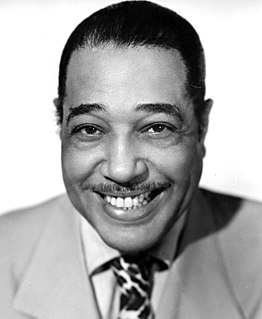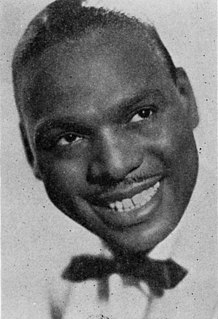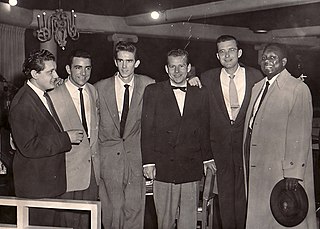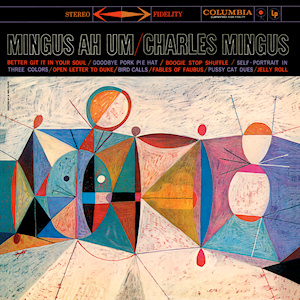
Charles Mingus Jr. was an American jazz upright bassist, pianist, composer, bandleader, and author. A major proponent of collective improvisation, he is considered to be one of the greatest jazz musicians and composers in history, with a career spanning three decades and collaborations with other jazz musicians such as Louis Armstrong, Duke Ellington, Charlie Parker, Dizzy Gillespie, and Herbie Hancock.

Louis Daniel Armstrong, nicknamed "Satchmo", "Satch", and "Pops", was an American trumpeter and vocalist. He was among the most influential figures in jazz. His career spanned five decades and different eras in the history of jazz.

Edward Kennedy "Duke" Ellington was an American jazz pianist, composer, and leader of his eponymous jazz orchestra from 1923 through the rest of his life. Born and raised in Washington, D.C., Ellington was based in New York City from the mid-1920s and gained a national profile through his orchestra's appearances at the Cotton Club in Harlem. A master at writing miniatures for the three-minute 78 rpm recording format, Ellington wrote or collaborated on more than one thousand compositions; his extensive body of work is the largest recorded personal jazz legacy, and many of his pieces have become standards. He also recorded songs written by his bandsmen, such as Juan Tizol's "Caravan", which brought a Spanish tinge to big band jazz. At the end of the 1930s, Ellington began a nearly thirty-year collaboration with composer-arranger-pianist Billy Strayhorn, whom he called his writing and arranging companion. With Strayhorn, he composed multiple extended compositions, or suites, as well as many short pieces. For a few years at the beginning of Strayhorn's involvement, Ellington's orchestra featured bassist Jimmy Blanton and tenor saxophonist Ben Webster and reached a creative peak. Some years later following a low-profile period, an appearance by Ellington and his orchestra at the Newport Jazz Festival in July 1956 led to a major revival and regular world tours. Ellington recorded for most American record companies of his era, performed in and scored several films, and composed a handful of stage musicals.

In vocal jazz, scat singing is vocal improvisation with wordless vocables, nonsense syllables or without words at all. In scat singing, the singer improvises melodies and rhythms using the voice as an instrument rather than a speaking medium. This is different from vocalese, which uses recognizable lyrics that are sung to pre-existing instrumental solos.

Eric Allan Dolphy Jr. was an American jazz alto saxophonist, bass clarinetist and flautist. On a few occasions, he also played the clarinet and piccolo. Dolphy was one of several multi-instrumentalists to gain prominence in the same era. His use of the bass clarinet helped to establish the instrument within jazz. Dolphy extended the vocabulary and boundaries of the alto saxophone, and was among the earliest significant jazz flute soloists.

Albany Leon "Barney" Bigard was an American jazz clarinetist known for his 15-year tenure with Duke Ellington. He also played tenor saxophone.

Earl Kenneth Hines, also known as Earl "Fatha" Hines, was an American jazz pianist and bandleader. He was one of the most influential figures in the development of jazz piano and, according to one source, "one of a small number of pianists whose playing shaped the history of jazz".

The Newport Jazz Festival is an annual American multi-day jazz music festival held every summer in Newport, Rhode Island. Elaine Lorillard established the festival in 1954, and she and husband Louis Lorillard financed it for many years. They hired George Wein to organize the first festival and bring jazz to Rhode Island.

Harry Howell Carney was a jazz saxophonist and clarinettist who spent over four decades as a member of the Duke Ellington Orchestra. He played a variety of instruments but primarily used the baritone saxophone, being a critical influence on the instrument in jazz.

"Mood Indigo" is a jazz song with music by Duke Ellington and Barney Bigard and lyrics by Irving Mills.
Robert "Bob" Thiele was an American record producer who worked on numerous classic jazz albums and record labels.
Quentin "Butter" Jackson was an American jazz trombonist.

Mingus Ah Um is a studio album by American jazz musician Charles Mingus, released in October 1959 by Columbia Records. It was his first album recorded for Columbia. The cover features a painting by S. Neil Fujita. The title is a corruption of an imaginary Latin declension. It is common for Latin students to memorize Latin adjectives by first saying the masculine nominative, then the feminine nominative, and finally the neuter nominative singular —implying a transformation of his name, Mingus, Minga, Mingum. The album was inducted into the Grammy Hall of Fame in 2013.

Leonard Geoffrey Feather was a British-born jazz pianist, composer, and producer, who was best known for his music journalism and other writing.
Stanley Frank Dance was a British jazz writer, business manager, record producer, and historian of the Swing era. He was personally close to Duke Ellington over a long period, as well as many other musicians; because of this friendship Dance was in a position to write "official" biographies. Over his career, his priority was advocating for the music of black ensembles performing sophisticated arrangements, based on Swing-era dance music.

Duke Ellington & John Coltrane is a jazz album by Duke Ellington and John Coltrane released in January 1963 on Impulse! Records.
"It Don't Mean a Thing " is a 1931 composition by Duke Ellington with lyrics by Irving Mills. It is now accepted as a jazz standard, and jazz historian Gunther Schuller characterized it as "now legendary" and "a prophetic piece and a prophetic title". In 2008, Ellington's 1932 recording of the song was inducted into the Grammy Hall of Fame.

Brian Priestley is an English jazz writer, pianist and arranger.

Jazz & Pop was an American music magazine that operated from 1962 to 1971. It was launched as Jazz and managed by Pauline Rivelli, with finance provided by Bob Thiele, the producer of jazz artists such as Duke Ellington, John Coltrane, Louis Armstrong, Earl Hines and Count Basie. The publication served as a rival title to Down Beat magazine, which had been established in the 1930s.














